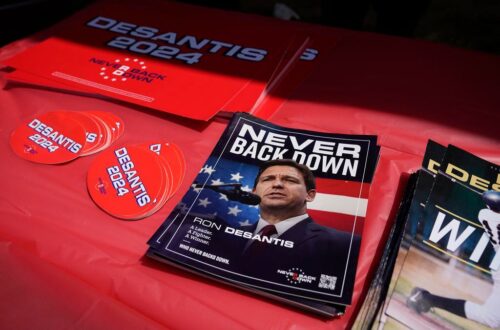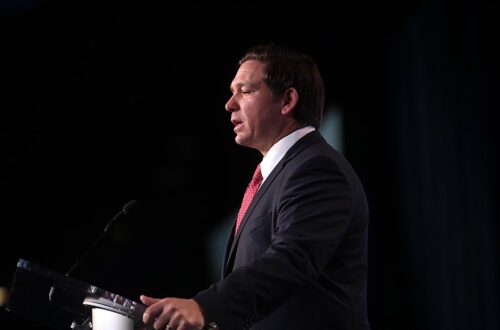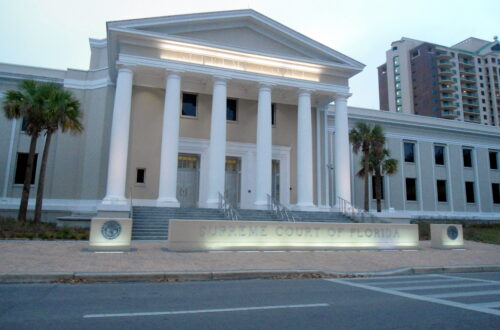Over the past year, Florida parental groups have challenged books that appear in school libraries, attempting to have them banned.
An ongoing effort, book banning has grown to encompass statewide organizing and legislative action, garnering widespread criticism. Book banning isn’t a new concept, either. Throughout the past century, many books have been banned or challenged for supporting taboo topics. Recently, the rise of new calls for bans in the state of Florida tend to address books relating to LGBTQ topics, race and the history of racism in the U.S.
Most present challenges to books and attempts at bans have come from parental groups operating at the district level with their efforts focused on school library collections. So far, many of these groups have had their efforts contained to single school districts but there’s also underlying organizing around book challenges throughout the state.
The Florida Department of Education has already weighed in on challenges to books and the state legislature has also taken action. However, these efforts have not gone unopposed and many educators, politicians and parents have criticized the challenges.
Librarians like April Hines, UF journalism and mass communications librarian, sees the banning as unfortunate.
“It would be unfortunate for students not to be exposed to ideas and worldviews outside of their own,” Hines said. “The real disservice is not being able to see yourself represented in the books that you want to read.”
The most commonly challenged books in this resurgence of bans are those that deal with race, sexuality or gender orientation. The justification given by parental groups pushing for their restriction is alleging the topics they discuss are inappropriate for children.
Although efforts are localized by district, organizations are attempting to unify the effort throughout the state — such as Moms for Liberty. This organization has campaigned throughout the state to challenge any books that reference race, critical race theory, discrimination, sexuality and gender topics.
The Melbourne-based group has sent letters to school boards calling for restrictions on the grounds of books being inappropriate for children, or unfair to the Church or Police. One chapter of the organization in Indian River County petitioned to have books removed to protect children from content they allege to be essentially pornography.
Jennifer Pippin, chair of the Indian River County branch of Moms for Liberty, was one of the people at the forefront of the petitioning.
“There is no educational value to children reading about rape, incest, bestiality, pedophilia, sexually explicit content or sexual acts,” Pippin said. “The statutes are in place to protect children from the authors, publishers and the people who want to sexualize children.”
The Florida Department of Education has also taken part in the challenges to books around the state by taking steps to restrict the content that students are exposed to. The department has used its newly implemented Benchmarks for Excellent Student Thinking (BEST) standards to restrict textbooks in the state that cover or use banned material.
In an April 2022 statement, the FLDOE reported that it had rejected 41 percent of all textbooks in the state and 71 percent of textbooks written for elementary school students. The department stated that books were rejected from circulation due to the inclusion of critical race theory, social-emotional learning and ‘race essentialism’.
This is not a stance held solely by the FLDOE either, the standards used by the department were set by the state legislature and align with House Bill 7 called the Stop WOKE Act, which seeks to ban the instruction of critical race theory in schools.
“Thanks to Governor DeSantis’ leadership, Florida leads the nation on this critical issue, with the Parents’ Bill of Rights signed in 2021, the Parental Rights in Education law (House Bill 1557) signed this year, along with other commonsense laws and policies,” said Cassie Palelis, press secretary for the Florida Department of Education, in a statement to the Florida Political Review.
The push to ban books hasn’t gone without a response from educators, librarians, judges or members of the community. The law used to justify rejecting textbooks at the state level, House Bill 7, is facing legal challenges with one district judge, Mark Walker, saying that Florida must prove its case for a post-racial society without “muzzling its opponents”.
Richard Borish, high school English teacher and parent, believes schools should allow a variety of books in their libraries.
“We should be trusted to read different ideas in print and use reason to choose between them, rather than having temptation removed through censorship,” Borish said.
As the fight for and against book bans unfolds in Florida, many different viewpoints have emerged along a continuum of support and opposition. Regardless of their goals and intentions, it’s ultimately the next generation who will have to live with the consequences of these actions.
Check out other recent articles from the Florida Political Review here.
Featured image: Protests in Florida over HB 1557 (Unmodified photo by Ted Eytan used under a creative commons license. https://bit.ly/3h4Byid)





